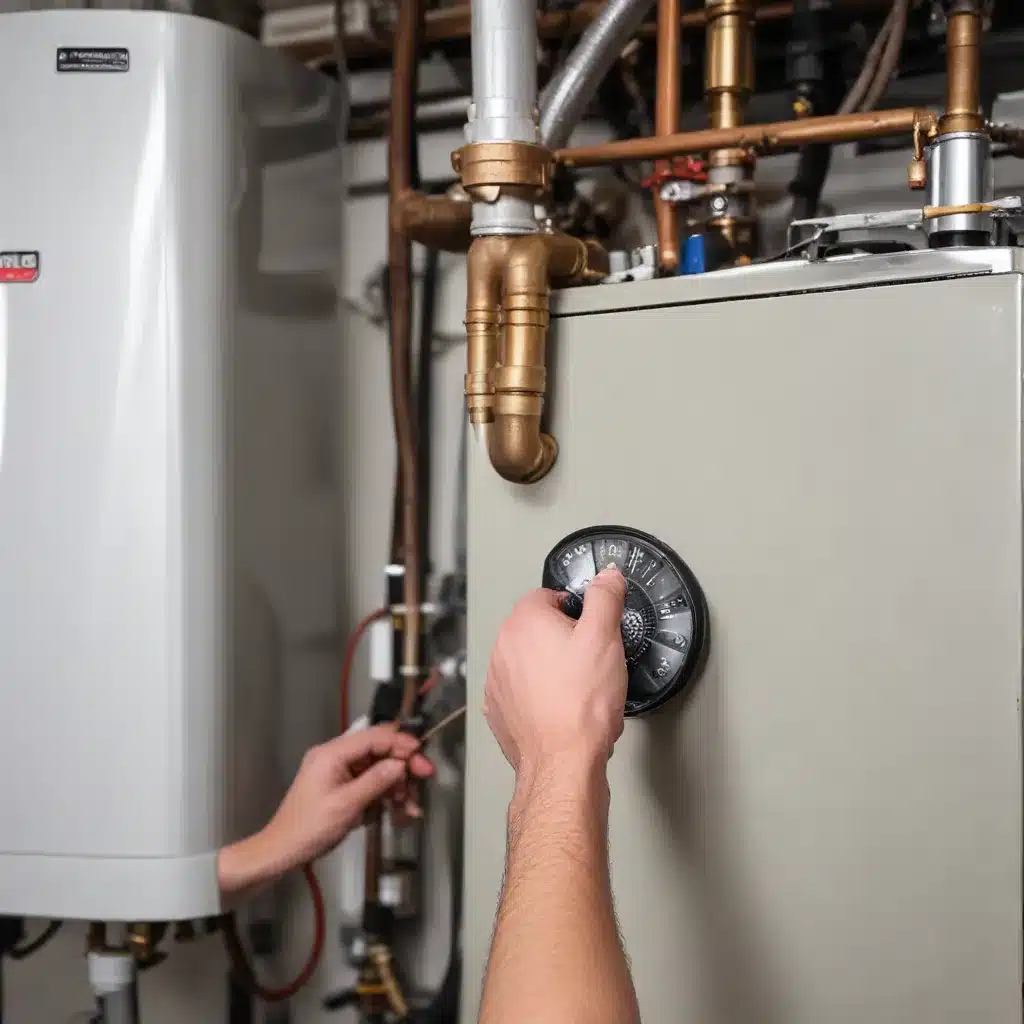
As a seasoned expert in plumbing and heating services, I’ve encountered my fair share of boiler problems. From no heat during the dead of winter to strange noises in the night, these issues can be both inconvenient and downright distressing for homeowners. However, many common boiler problems can be resolved with some simple troubleshooting techniques, while others may require the expertise of a professional.
In this comprehensive guide, we’ll explore the most prevalent boiler issues, provide practical DIY troubleshooting tips, and discuss when it’s best to call in a professional for assistance.
Identifying Common Boiler Problems
No Heat or Hot Water
One of the most immediate concerns for homeowners is a boiler that’s not producing heat or hot water. This can be caused by a variety of issues, ranging from broken diaphragms and airlocks to problems with the thermostat or low water levels.
Troubleshooting Tips:
– Check the thermostat settings and ensure it’s turned on and set to the correct temperature.
– Bleed the radiators to release any trapped air in the system.
– Inspect the pressure gauge and add more water if the pressure is too low.
– Verify that the boiler’s pilot light is lit and the fuel supply is working.
If none of these steps resolve the issue, it’s best to call in a professional plumber or boiler technician to further diagnose and repair the problem.
Strange Noises
Boilers often make a variety of sounds during normal operation, but certain noises may indicate underlying issues that require attention. Banging, whistling, or gurgling noises could be a sign of air in the system, low water pressure, or an impending pump failure.
Troubleshooting Tips:
– Identify the source of the noise and its location within the boiler system.
– Check the water pressure and add more if it’s too low.
– Bleed the radiators to release any trapped air.
– Inspect the pump for any signs of wear or damage.
If the noises persist or worsen, it’s advisable to have a professional technician assess the boiler and recommend the appropriate course of action.
Boiler Leaks
Leaks can originate from various components of the boiler system, depending on the underlying cause. Common culprits include pressure valve faults, pump seal deterioration, or corrosion within the system.
Troubleshooting Tips:
– Visually inspect the boiler and associated pipes for any signs of water leakage.
– Check the pressure relief valve and ensure it’s functioning properly.
– Examine the pump seals for any cracks or damage.
– Look for signs of corrosion or mineral buildup that could be causing the leak.
If you’re unable to identify the source of the leak or the problem persists, it’s best to contact a professional plumber who can perform a thorough inspection and provide the necessary repairs.
Low Pressure
Low boiler pressure is a common issue that can arise from a variety of causes, most commonly a water leak in the system. If the pressure gauge reads below 1 bar, it’s an indication that something is amiss and requires attention.
Troubleshooting Tips:
– Check for any visible leaks in the boiler or associated pipes.
– Inspect the pressure relief valve and ensure it’s functioning correctly.
– Use the filling loop to increase the pressure if it’s too low.
If the pressure continues to drop or you’re unable to identify the source of the problem, it’s advisable to have a professional technician assess the boiler and provide the necessary repairs.
When to Call a Professional
While some minor boiler issues can be addressed through DIY troubleshooting, it’s essential to recognize when the problem requires the expertise of a professional. Here are some key indicators that it’s time to call in the experts:
- The problem persists despite your troubleshooting efforts.
- The boiler requires disassembly or the removal of the casing, which can be dangerous if you’re not a certified engineer.
- The issue involves electrical components or complex system integration.
- You’re unsure about the cause of the problem or the steps required to fix it.
- The boiler is older or requires more extensive repairs.
Remember, your safety should always be the top priority. Attempting repairs that are beyond your skill level or comfort level can lead to further damage or even personal injury. It’s better to err on the side of caution and consult a professional plumber or boiler technician, like the team at DD Plumbing and Heating, who can properly diagnose and address the issue.
Proactive Maintenance: The Key to Avoiding Boiler Issues
While troubleshooting common boiler problems can be helpful, the best way to ensure your heating system remains in top shape is through regular, professional maintenance. By scheduling routine check-ups and tune-ups, you can catch minor issues before they escalate into major headaches.
When searching for a reliable boiler service provider, look for licensed professionals with a proven track record and positive customer reviews. A reputable technician will not only perform the necessary maintenance tasks but also provide valuable insights and recommendations to keep your boiler running efficiently.
Remember, taking a proactive approach to boiler maintenance can save you time, money, and the hassle of dealing with unexpected breakdowns. By investing in the long-term health of your heating system, you can rest assured that your home will stay warm and comfortable all year round.
If you’re unsure about your boiler’s condition or need assistance with any heating-related issues, don’t hesitate to contact the experts at DD Plumbing and Heating. With their wealth of experience and commitment to customer satisfaction, they can help you troubleshoot, maintain, and upgrade your home’s heating system for optimal performance and energy efficiency.


